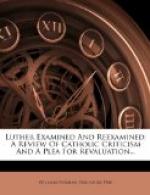9. Professor Luther, D. D.
Catholic writers greedily grab every opportunity to belittle Luther’s scholarship. Incentives to study at home, they say, he received none. His common school education was wretched. During his high school studies he was favored with good teachers, but hampered by his home-bred roughness and uncouthness and his poverty. He applied himself diligently to his studies, but gave no sign of being a genius. At the University of Erfurt, too, he was studious, but he seems to have made no great impression on the University. “He paid little attention to grammatical details, and never attained to Ciceronian purity and elegance in speech and writing.” When he made his A. B:, he ranked thirteenth in a class of fifty-seven. He did a little better in his effort for the title of A. M., when he came out second among seventeen candidates. But Melanchthon is declared entirely wrong when he relates that Luther was the wonder of the University. His theological studies preparatory to his entering the priesthood were very hasty and superficial. Still less prepared was he for the work of a professor. His duties in the cloister left him little time for learned studies. Yet he went to “bibulous Wittenberg,” to a little five-year-old university, and lectured “as best he could.” By the way, our Catholic friends seem to forget that “bibulous” Wittenberg was a good old Catholic town at the time. All things considered, Luther’s advancement was all too rapid; it was not justified by his preparatory studies, which had been “anything but deep, solid, systematic.” “The theological culture he received was not on a par with that required now by the average seminarian, let alone a Doctor of Divinity.” He accepted the title of D. D. very reluctantly, being conscious that he did not deserve it. A feeling of the insufficiency of his education tormented him all through life. “It cannot be denied that he was industrious, self-reliant, ambitious, but withal, he was not a methodically trained man. At bottom, he was neither a philosopher nor a theologian, and at no time of his life, despite his efforts to acquire knowledge, did he show himself more than superficially equipped to grapple with serious and difficult philosophical and religious problems. His study never rose to brilliancy.” Thus runs the Catholic account of Professor and Doctor Luther.




